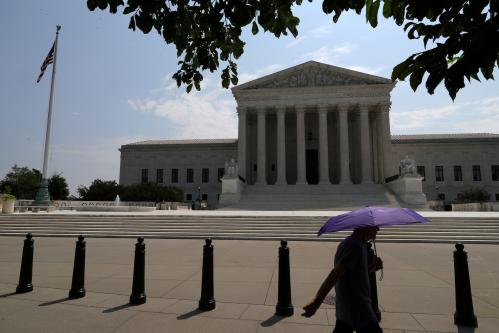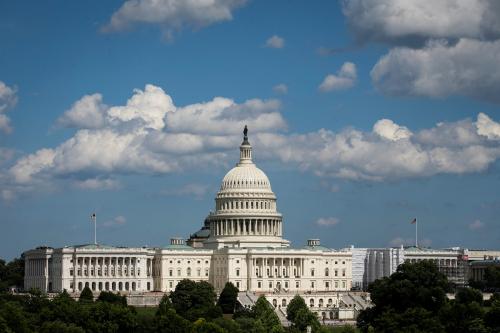This piece originally appeared in USA Today.
If the House of Representatives wants to release the Democratic response to the “Nunes memo,” its members can do so now. President Trump can’t stop them—though he surely will tweet about it. The House just has to do what it does best: Vote.
The controversial memo written by Rep. Devin Nunes (R-Calif.), chairman of the House Intelligence Committee, purported to show that the FBI abused its surveillance authority and that the Russia probe is biased. The committee sent it to the White House for clearance at the end of January under House Rule X, which authorizes such transmission.
The president’s review was pro forma at best. Even before he had read it, he was caught on a hot mic saying he would “100%” release the memo, and he did.
Then the committee voted to disclose the Democratic rebuttal memo, once more sending it to Trump to approve release. But unlike its predecessor, it is getting slow walked by the president. He has rejected its release and demanded a memo rewrite behind closed doors.
The House can put an end to this posturing right now. Its rule book contemplates that a president might rebuff an effort to reveal sensitive information. Here too, Rule X lays out the process. If the president objects to releasing information, a majority of the Intelligence Committee can ask the full House to vote and the chamber—also by a majority—can approve the memo’s release. That is not only in accordance with House rules, but the Constitution. As a coequal branch of government under the Constitution, Congress has the full authority to take that action.
This would only happen with bipartisan cooperation and a real dedication to transparency by GOP leaders—both rare commodities these days. But even if that were lacking, the memo could still see the light of day.
History shows how. Almost 40 years ago, in the midst of another showdown between a president and Congress (and the press) over classified material, an Alaska Democrat put 4,000 pages of the Pentagon Papers into the public record.
Shortly after receiving a copy of the papers from The Washington Post’s Ben Bagdikian, Sen. Mike Gravel scheduled a 9:45 p.m. meeting of a Senate panel he chaired, the Subcommittee on Buildings and Grounds. With the official record open, Gravel began reading the papers aloud until 1 a.m. when he asked unanimous consent to place them all into the record. The papers were public.
If lawmakers wanted to use this device to make the 10-page memo public, they could. Rather than putting the onus on any one individual, it could be done jointly by a bipartisan group that includes majority members willing to buck their leaders for the sake of fairness. That would avoid the specter of Trump retaliation (for instance, putting a single brave soul in the president’s sights). Legally, they would be as much in the clear as Gravel was.
If the memo were released anywhere but in a legislative proceeding and by anyone other than members of Congress (or staffers), there might be serious legal consequences. But the Constitution grants members of Congress immunity from prosecution or “privilege … for any Speech or Debate in either House.” Making the Democratic memo public is legislative activity entitled to constitutional protection.
At its heart, the memo deals with a law—the Foreign Intelligence Surveillance Act— which is regularly subject to congressional oversight and revision. In fact, the law was rewritten by Congress last month. And unlike the Nunes memo, there is no reason to suspect that the Democratic memo was orchestrated in tandem with the White House as part of its possible efforts to obstruct justice, or otherwise falls outside the scope of congressional immunity.
The Gravel case is instructive. After his late-night maneuver, the Justice Department opened a criminal investigation of Gravel’s staffer and apparently the senator himself. The case went to the Supreme Court, which extended the clause’s protection to staff and also gave its blessing to the senator’s work in the subcommittee.Gravel’s “insistence is that the Speech or Debate Clause at the very least protects him from criminal or civil liability and from questioning elsewhere than in the Senate, with respect to the events occurring at the subcommittee hearing at which the Pentagon Papers were introduced into the public record. To us this claim is incontrovertible,” the Supreme Court wrote.
Since Gravel’s day, at least six more members of Congress from both parties have released sensitive or classified information and relied on the Constitution to protect them from executive branch retaliation. That means if members of Congress (or their aides) can manage to read the memo out loud or insert it into the record during any official proceeding of the House or Senate, they are exempt from prosecution for disclosing classified information.
They would not, however, be exempt from discipline by the House itself. Members could be stripped of their committee assignments, fined, censured or even expelled.
That is why the course we suggest should be undertaken by a bipartisan group if the president continues his game-playing and if the full committee or House vote proves impracticable. Having seen the behavior of the leadership of the majority, we are not optimistic about its good faith. But we hope some still resides among the rank-and-file. Using this route to release the Democratic memo is not for the faint of heart. But neither, it seems, is democracy these days.
The Brookings Institution is committed to quality, independence, and impact.
We are supported by a diverse array of funders. In line with our values and policies, each Brookings publication represents the sole views of its author(s).









Commentary
Trump can’t block the Democratic memo on Russia. Here’s why.
February 18, 2018